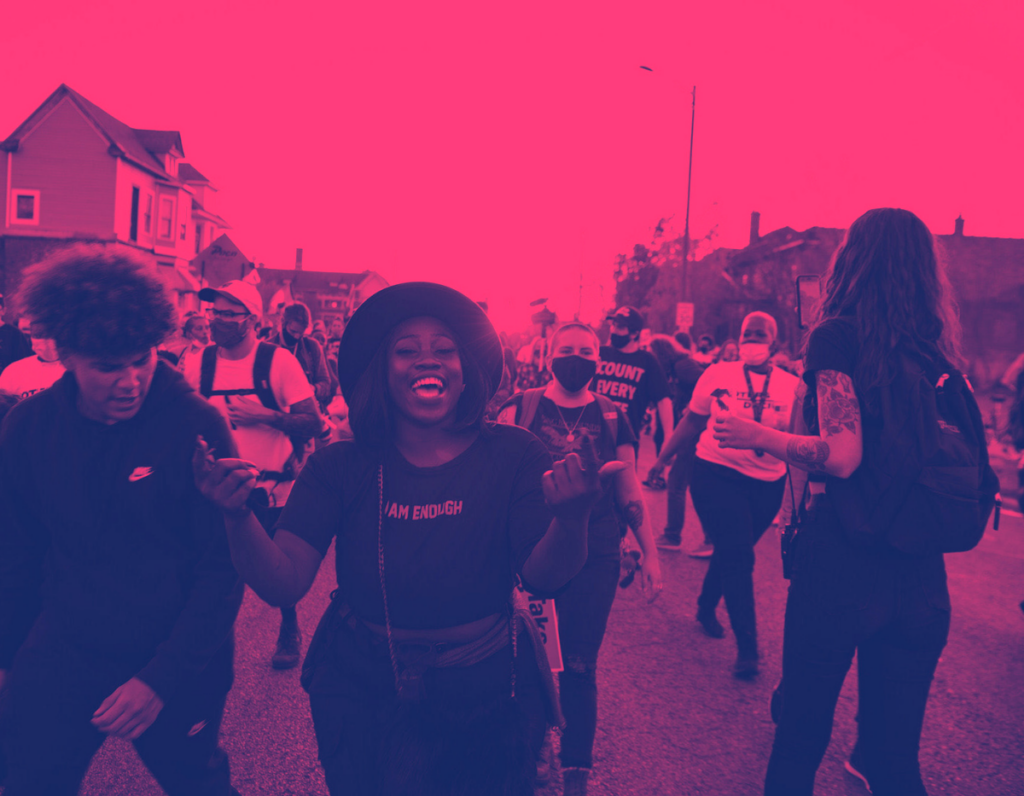Democracy weathered one of the toughest stress tests of 2020 in Michigan, and We the People Michigan helped anchor the grassroots organizing that made that possible. Art Reyes III, the group’s founding executive director, and Eli Day, a journalist and its communications director, tell that story in one chapter of Power Concedes Nothing. In a recent interview, Reyes talked a bit about why they took the time to write, and what lessons we most need to carry forward.
“When we think about what went down in 2020, we see that multiracial working-class people, everyday folks from every corner of the state, were the ones who prevailed. When the democracy that we currently have was teetering on the brink, it was community leaders across race, across rural, suburban, urban, who locked arms and saved it.
“That story is really important to be told. Especially in the midst of increasingly violent rhetoric and really cynical and ugly politics, it’s really important to remind ourselves who won, who’s responsible for that, and how it happened, because that’s immensely hopeful for the future. It’s helpful and hopeful to remind ourselves that in moments of intense threat, it was multiracial working-class people who rose to the occasion….We are the ones we are looking for.
“It’s much easier for narratives rooted in fear to spread prolifically than the story of the patient work of people building relationships and trust with each other, taking care of each other in community, and understanding we have a linked fate across our communities and have to have each others’ backs. When we look at the labor movement, the civil rights movement, the freedom struggle more broadly, it has always rested on everyday folks deciding that things need to change. This is of that lineage. While there may be a lot of things to feel anxious about, for me the predominant feeling is one of hope, because I’ve seen what people can do when things are at their scariest.
What matters
“And that is perhaps biggest lesson we carry forward. There were a lot of organizing lessons that were also important. Relationships and trust really matter. Structure matters. We had to be very explicit and clear about race.
“We knew the playbook the right would play. We told everyone that Michigan will be a target because of its political importance and the closeness of the last election. It is one of the most segregated places in the United States. As a whole, it’s between 75 and 80% white. Our largest city by far is the city of Detroit, which is more than 90% people of color, nearly 80% Black.
“We said that when the right begins attacking voting rights in Michigan, they will attack Detroit and Black voters. Repeatedly we’ve seen the right wading into into divide-and-conquer politics.
“On top of the levels of segregation, we’ve also had multi-generational economic devastation in places like Flint, where I grew up, Detroit, Pontiac, Benton Harbor, places that are virtually all folks of color, majority-Black cities. But it is also the case in rural parts of the state.
“The Upper Peninsula, by some accounts, has been in recession since the mid-1990s. . . .it used to be a big mining area. A lot was stripped and extracted from there, particularly in the last century with the copper rush. It’s extremely rural, poor, both white and Indigenous. There’s only one way in and out of it in the state of Michigan, and that’s the Mackinaw Bridge. It’s a place that has been pretty isolated.
“When you have such a level of segregation, you become fertile ground for divide-and-conquer politics—unless you are willing to take that head-on, to let people know in very clear terms that there is a set of political, wealthy, and corporate actors that benefit immensely from using the pain they’re experiencing. That’s a playbook we’ve seen time and time again.
“And sure enough, when we heard from the White House two days after the election, ‘Detroit cannot be trusted, it’s a corrupt city,’ everyone we’d prepared understood that for what it was: an attack on Black voters, a racist dog whistle that was seeking to divide us.”
From Power Concedes Nothing, ‘The Battle for Democracy in Michigan,’ by Art Reyes III and Eli Day:
Following their marching orders on election night, challengers descended on Detroit’s TCF Center on November 3, 2020. As dozens of us who were there can confirm, these challengers were allowed to observe the count, and were only addressed when they lurked over the bodies of counters and barked out orders at them in violation of the rules. In a ballroom full of working-class Black and Brown Detroiters, working tirelessly through the night at a difficult and thankless job that underpins our democracy, Foster’s strategy led to a grotesque display of racist theater. While a routine count was underway indoors, a small but shrieking mob of white Michiganders from far-flung corners of the state was chanting “Stop the count!” at overwhelmingly Black election officials. You didn’t have to look hard to catch the horrific parallel to the countless episodes in American history of fierce white backlash to Black democratic participation.
Thankfully, Detroiters and others who love and stand with this city came out in forceful numbers to defend democracy and ensure that every vote was counted. We know that in recent memory, communities across Michigan—especially Black and Brown ones—have had their voices taken from them. It was just in 2012 that voters defeated the state’s dictatorial emergency manager law only to see Republican Governor Rick Snyder ram it back through the legislature. The move gave him the power to install emergency managers that superseded mayors and city councils and had unilateral control over school boards and city finances, under the guise of helping municipalities and school districts that were financially struggling. It crushed local democracy and imposed fiscal tyranny in majority Black cities like Detroit, Flint, and Benton Harbor.
The consequences have literally been poisonous for working-class people in the case of Flint. Many of the organizers and everyday people who recently rose in defense of Detroit’s election process were also active on the frontlines of those earlier fights against state-imposed despotism, making them clear-eyed, fierce, and battle-tested defenders of democracy.
So when Republican state legislators subpoenaed the Board of Elections for voting records after the election, based on what even the conservative Detroit News calls “unsubstantiated claims” of voter fraud, we were all on high alert to ensure that our voices weren’t pushed aside again. And we won.
Communities reject divide-and-conquer
When Trump began attacking Detroit as one of “the most corrupt political places anywhere in our country,” we kicked our statewide organizing machine into gear. The action councils we built positioned us to respond across rural and urban communities and across race immediately, telling a powerful story about the solidarity found in Michigan’s diverse communities. Those communities issued a thundering response to Trump. Thousands of people mobilized in events held in communities from Detroit to Hancock, Grand Rapids to Marquette, Ann Arbor to Traverse City, and many places in between. People sang and danced in the streets and joyously celebrated—not in the name of any politician, but in the name of our communities and our ability to stand up for each other.
At every turn, Trump and his Republican allies would seek to drive yet another divide-and-conquer tactic to pit communities against one another, but we were ready for them. When the Wayne County Board of Canvassers met over Zoom on November 17, 2020, initially voting 2–2 to halt certification and stop counting votes prematurely, over 300 people stayed on the conference call for nearly six hours to give testimony expressing their outrage at the clear attempt to disenfranchise Black voters in Detroit. The board’s move was deeply bizarre given its narrow purpose and the complete lack of evidence that any election irregularities had occurred. The board, after all, is composed of four governor-appointed members whose main job is to certify election results. After significant public pressure, the board later reversed its vote, certifying the Wayne County results.
On November 20, Trump summoned Republican state legislative leaders to Washington, DC, on the eve of the Michigan State Board of Canvassers meeting to pressure them into doing his bidding. We were able to shed public light on their trip and confronted Republican State Senator Mike Shirkey at the airport as he left Detroit, landed in DC, and returned.
On November 23, a mile-long car caravan rolled through Lansing with slogans like “Certify the Vote’’ and “The People Have Spoken,” while a livestream digital event was taking place with dispatches from across Michigan communities. Hundreds of Michigan residents gave hours of testimony, even after the board voted to certify. Black, white, Brown, Indigenous, Yooper (residents of Michigan’s Upper Peninsula), Detroiter, suburbanite, all testified with clarity that the people had spoken, and attempts to halt certification were rooted in racist and unfounded attacks on Detroit. We were able to respond robustly because of months of organizing and scenario planning built upon years of intentional multiracial organizing and relationship building. It is how a mass of multiracial Michiganders stood together and resoundingly rejected attempt after attempt to undermine our democracy by denigrating Detroit voters.

Did you enjoy this article?
We're in the middle of our annual fund drive, and this year we're building our own internal infrastructure for subscriptions, meaning more of every dollar pledged goes to fulfilling our mission. Subscribe today to support our work and be a part of Convergence's next evolution.

